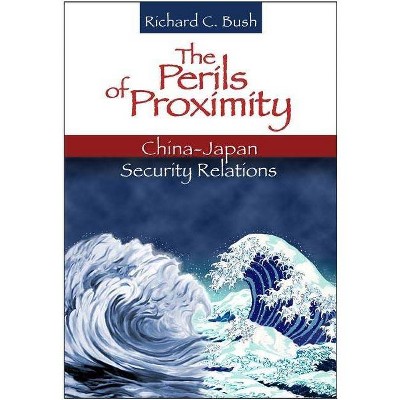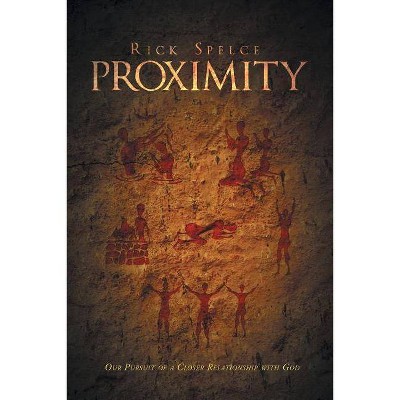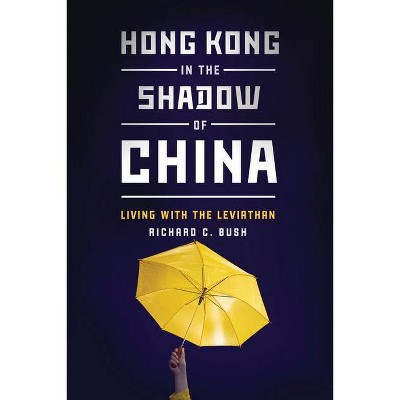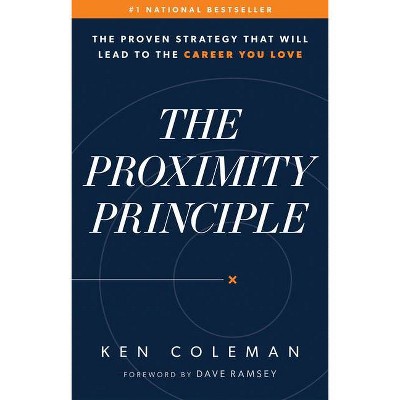The Perils of Proximity - by Richard C Bush (Paperback)

Similar Products
Products of same category from the store
AllProduct info
<p/><br></br><p><b> About the Book </b></p></br></br><p>The rivalry between Japan and China has a long and sometimes brutal history, and they continue to eye each other warily as the balance of power tips toward Beijing. They cooperate and compete at the same time, but if competition deteriorates into military conflict, the entire world has much to lose. <i>The Perils of Proximity</i> evaluates the chances of armed conflict between China and Japan, presenting in stark relief the dangers it would pose and revealing the steps that could head off such a disastrous turn of events.</p> <p>Richard Bush focuses his on the problematic East China Sea region. Although Japan's military capabilities are more considerable than some in the West realize, its defense budget has remained basically flat in recent years. Meanwhile, Chinese military expenditures have grown by double digits annually. Moreover, that the emphasis of China's military modernization is on power projection--the ability of its air and naval forces to stretch their reach to the east, thus encroaching on its island neighbor.</p> <p>Tokyo regards the growth of Chinese power and its focus on the East China Sea with deep anxiety. How should they respond? The balance of power is changing, and Japan must account for that uncomfortable fact in crafting its strategy. It is incumbent on China, Japan, and the United States to take steps to reduce the odds of clash and conflict in the East China Sea, and veteran Asia analyst Bush presents recommendations to that end. The steps he suggests won't be easy, and effective political leadership will be absolutely critical. If implemented fully and correctly, however, they have the potential of reducing the perils of proximity in Asia.</p><p/><br></br><p><b> Book Synopsis </b></p></br></br><p>The rivalry between Japan and China has a long and sometimes brutal history, and they continue to eye each other warily as the balance of power tips toward Beijing. They cooperate and compete at the same time, but if competition deteriorates into military conflict, the entire world has much to lose. <i>The Perils of Proximity</i> evaluates the chances of armed conflict between China and Japan, presenting in stark relief the dangers it would pose and revealing the steps that could head off such a disastrous turn of events.</p> <p>Richard Bush focuses his on the problematic East China Sea region. Although Japan's military capabilities are more considerable than some in the West realize, its defense budget has remained basically flat in recent years. Meanwhile, Chinese military expenditures have grown by double digits annually. Moreover, that the emphasis of China's military modernization is on power projection--the ability of its air and naval forces to stretch their reach to the east, thus encroaching on its island neighbor.</p> <p>Tokyo regards the growth of Chinese power and its focus on the East China Sea with deep anxiety. How should they respond? The balance of power is changing, and Japan must account for that uncomfortable fact in crafting its strategy. It is incumbent on China, Japan, and the United States to take steps to reduce the odds of clash and conflict in the East China Sea, and veteran Asia analyst Bush presents recommendations to that end. The steps he suggests won't be easy, and effective political leadership will be absolutely critical. If implemented fully and correctly, however, they have the potential of reducing the perils of proximity in Asia.</p><p/><br></br><p><b> Review Quotes </b></p></br></br><br><P>"Richard Bush presents with clarity and in well-researched detail the serious disputes between Japan and China concerning sovereignty over islands and sovereign rights to resources in and under the waters of the East China Sea. His analysis of the forces that could drive each side toward unintended and undesired conflict is compelling and provides a cautionary counterpoint to those who believe that rational actors would not risk economic and political progress to move boundary markers. "Perils of Proximity" insightfully unwraps the layers of security challenges in East Asia and concludes with wise counsel on how to begin addressing those challenges. I have no doubt that it will soon be required reading for East Asia security specialists in and out of government and an enduring case study for many years to come."--Peter A. Dutton, China Maritime Studies Institute, U.S. Naval War College<br><br><P>"The Sino-Japanese relationship has become a contradictory mix of economic interdependence and geostrategic rivalry. U.S. policymakers have struggled to find a strategy that reassures Japan and dissuades China without sparking greater rivalry between the two. With his meticulous research in both Japan and China and a policy veteran's eye for pragmatic solutions, Richard Bush has broken the code on how that might be done."--Michael Green, Center for Strategic and International Studies<br><br><P>"This study is a superb blend of synthesis and analysis that will appeal to both specialists and lay readers. It takes a scholar with Richard Bush's broad experiences and insight to explain with clarity Chinese and Japanese foreign policy behaviors in terms of institutions, culture, process, and strategic weltanschauung. A significant addition to the field!"--Dr. David M. Finkelstein, Vice President, Center for Naval Analyses<br><p/><br></br><p><b> About the Author </b></p></br></br><p> <b>Richard C. Bush</b>'s two-decade public service career spans Congress, the intelligence community, and the U.S. State Department. He currently focuses on China-Taiwan relations, U.S.-China relations, the Korean peninsula, and Japan's security. He is the author of, among other works, <i>Uncharted Strait: The Future of China-Taiwan Relations</i> (Brookings, 2012).</p>
Price History
Price Archive shows prices from various stores, lets you see history and find the cheapest. There is no actual sale on the website. For all support, inquiry and suggestion messagescommunication@pricearchive.us




















